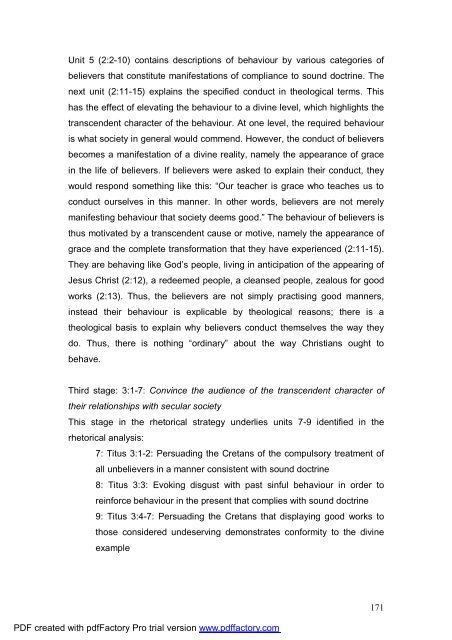A Text centred rhetorical analysis of Paul's Letter to Titus
A Text centred rhetorical analysis of Paul's Letter to Titus
A Text centred rhetorical analysis of Paul's Letter to Titus
You also want an ePaper? Increase the reach of your titles
YUMPU automatically turns print PDFs into web optimized ePapers that Google loves.
Unit 5 (2:2-10) contains descriptions <strong>of</strong> behaviour by various categories <strong>of</strong><br />
believers that constitute manifestations <strong>of</strong> compliance <strong>to</strong> sound doctrine. The<br />
next unit (2:11-15) explains the specified conduct in theological terms. This<br />
has the effect <strong>of</strong> elevating the behaviour <strong>to</strong> a divine level, which highlights the<br />
transcendent character <strong>of</strong> the behaviour. At one level, the required behaviour<br />
is what society in general would commend. However, the conduct <strong>of</strong> believers<br />
becomes a manifestation <strong>of</strong> a divine reality, namely the appearance <strong>of</strong> grace<br />
in the life <strong>of</strong> believers. If believers were asked <strong>to</strong> explain their conduct, they<br />
would respond something like this: “Our teacher is grace who teaches us <strong>to</strong><br />
conduct ourselves in this manner. In other words, believers are not merely<br />
manifesting behaviour that society deems good.” The behaviour <strong>of</strong> believers is<br />
thus motivated by a transcendent cause or motive, namely the appearance <strong>of</strong><br />
grace and the complete transformation that they have experienced (2:11-15).<br />
They are behaving like God’s people, living in anticipation <strong>of</strong> the appearing <strong>of</strong><br />
Jesus Christ (2:12), a redeemed people, a cleansed people, zealous for good<br />
works (2:13). Thus, the believers are not simply practising good manners,<br />
instead their behaviour is explicable by theological reasons; there is a<br />
theological basis <strong>to</strong> explain why believers conduct themselves the way they<br />
do. Thus, there is nothing “ordinary” about the way Christians ought <strong>to</strong><br />
behave.<br />
Third stage: 3:1-7: Convince the audience <strong>of</strong> the transcendent character <strong>of</strong><br />
their relationships with secular society<br />
This stage in the <strong>rhe<strong>to</strong>rical</strong> strategy underlies units 7-9 identified in the<br />
<strong>rhe<strong>to</strong>rical</strong> <strong>analysis</strong>:<br />
7: <strong>Titus</strong> 3:1-2: Persuading the Cretans <strong>of</strong> the compulsory treatment <strong>of</strong><br />
all unbelievers in a manner consistent with sound doctrine<br />
8: <strong>Titus</strong> 3:3: Evoking disgust with past sinful behaviour in order <strong>to</strong><br />
reinforce behaviour in the present that complies with sound doctrine<br />
9: <strong>Titus</strong> 3:4-7: Persuading the Cretans that displaying good works <strong>to</strong><br />
those considered undeserving demonstrates conformity <strong>to</strong> the divine<br />
example<br />
PDF created with pdfFac<strong>to</strong>ry Pro trial version www.pdffac<strong>to</strong>ry.com<br />
171

















